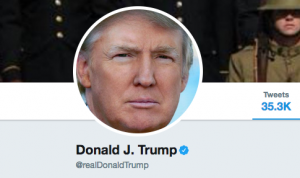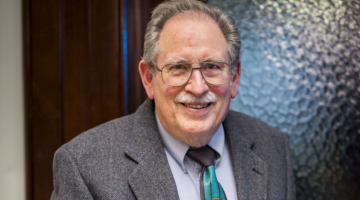 A week ago, the Second Circuit Court of Appeals unanimously held that the current president could not block Twitter users from following his account. More specifically, the court concluded “that the First Amendment does not permit a public official who utilizes a social media account for all manner of official purposes to exclude persons from an otherwise-open online dialogue because they expressed views with which the official disagrees.” Because this decision completely overlooks or ignores the obvious legal structure of the president’s Twitter account, I can expect or at least only hope that it will one day be overturned.
A week ago, the Second Circuit Court of Appeals unanimously held that the current president could not block Twitter users from following his account. More specifically, the court concluded “that the First Amendment does not permit a public official who utilizes a social media account for all manner of official purposes to exclude persons from an otherwise-open online dialogue because they expressed views with which the official disagrees.” Because this decision completely overlooks or ignores the obvious legal structure of the president’s Twitter account, I can expect or at least only hope that it will one day be overturned.
According to the Second Circuit, the president’s Twitter account bears “all the trappings of an official, state-run account” given that the president regularly uses it to make announcements relating to his office. Although this description of use is undeniably true, it is also completely irrelevant. How the president uses the account should matter far less than the unambiguous and legal fact of just who owns and in effect “controls” the Twitter account, and spoiler alert: It is not the president.
As noted by others, examining Twitter’s terms of service reveals that Twitter — not the president — not only owns the rights to the communication, but is in complete control of access to the forum and the specific account, including control over the ability of the president to block other users. In other words, the president does not own or control the tweets from his account, Twitter does, and this fact severely undermines the analysis used by the Second Circuit. It means that when joining or using Twitter the president is not, as the Second Circuit claims, opening up “the interactive features of his account to the public at large.” Rather, the president like any other user on Twitter, is opening up only to other private members who have been given access to the forum at the sole discretion of Twitter. Meaning, Twitter is in every way the complete opposite of a public forum in that all access, and content, are entirely controlled by a private entity.

8 Tips For Creating A Comprehensive ‘AI In The Workplace’ Policy
Corporate investment and usage in generative AI technologies continues to accelerate. This article offers eight specific tips to consider when creating an AI usage policy.
As law professor Greg Dolin illustrates, Twitter’s control over the forum makes it a uniquely different place, very often with different content than what is found in a public forum. Per Dolin:
In a traditional public forum, an individual has a right to engage in whatever outrageous or vile speech he wishes. Should he choose to march down the street, in a heavily Jewish neighborhood while clad in a Nazi uniform, he can. If someone wishes to carry signs down Pennsylvania Avenue advocating genocide of one group or another, they cannot be prohibited from doing so. But if someone tweets the same sign or uses a Nazi swastika as their avatar they would likely be banned by Twitter in very short order. So whereas all viewpoints, no matter how odious, have to be permitted in a public forum, the same simply doesn’t hold true for social media. That alone suggests that the control over who gets to talk is exercised not by the government but by the corporate entity.
For a more recent example, just this past weekend the president used Twitter to spew what many, including myself, would describe as racist rhetoric. Supposedly, Twitter has a policy against racist rhetoric and therefore could use the president’s tweets from this past weekend to ban him from the forum, should it so choose. And it is precisely because of that power to ban the content and viewpoints of the most powerful person on earth that makes Twitter such a profoundly different place than a public forum. I also agree with professor Dolin that the case would be different if the president used his power and influence “to convince Twitter’s CEO to ban individuals critical of the President from the platform altogether.” However, the bottom line is, because Twitter is in every sense a private forum controlled by a private entity, the First Amendment does not factor into your right to see anything on the platform at all.
Would it be better, or arguably fairer to society, if Twitter adjusted its terms and conditions so that no publicly elected official using its forum could block people? I, for one, think so, but I also understand that because Twitter controls the forum that is Twitter’s call to make on whether to adopt such a policy or not. The ultimate irony about this decision from the Second Circuit is that although it may appear to have gone against the president, on the much bigger issue of social media in general, the decision amounts to a substantial win.

A Career In Legal Services: Practising Law Institute Honors Toby J. Rothschild
PLI honors Toby J. Rothschild with its inaugural Victor J. Rubino Award for Excellence in Pro Bono Training, recognizing his dedication and impact.
For some time now, this president and conservatives in general have complained that social media companies possess a bias against and censor conservative speech. The long used and obvious answer to such arguments has been, so what? These are private companies that have the ability to control their own forums or freely associate in whatever way they see fit. However, this decision out of the Second Circuit is fodder for anyone trying to claim that social media involves “First Amendment implications.” Such a claim used to be a complete joke; that it now contains a grain of legal truth is not only sad, but disturbing.
 Tyler Broker’s work has been published in the Gonzaga Law Review, the Albany Law Review, and is forthcoming in the University of Memphis Law Review. Feel free to email him or follow him on Twitter to discuss his column.
Tyler Broker’s work has been published in the Gonzaga Law Review, the Albany Law Review, and is forthcoming in the University of Memphis Law Review. Feel free to email him or follow him on Twitter to discuss his column.